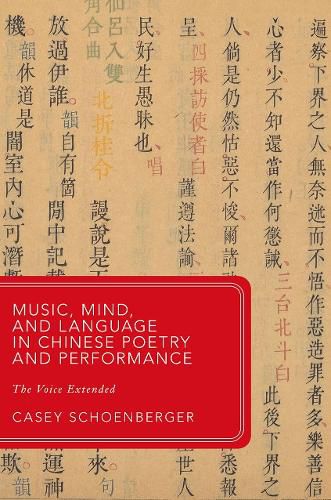Readings Newsletter
Become a Readings Member to make your shopping experience even easier.
Sign in or sign up for free!
You’re not far away from qualifying for FREE standard shipping within Australia
You’ve qualified for FREE standard shipping within Australia
The cart is loading…






"Poetry puts intent into words; singing lengthens words"--this is one of the earliest Chinese comments on artistic expression. Poetic language extends the reach of a sentiment beyond the individual, and musicality extends the reach of poetic language, not only across a room, but across geography and generations. The "extended mind thesis" (EMT) views minds as extending beyond individual nervous systems to include material and social environments. Music, Mind, and Language in Chinese Poetry and Performance: The Voice Extended offers a comprehensive overview of the interwoven histories of traditional Chinese poetry and performing arts. It employs cognitive and quantitative methods such as EMT, and a database of over six thousand traditional melodies, to describe cyclical, continuous interactions between social minds and material artifacts. From the ancient Canon of Poetry to the song-lyrics (ci) of the late medieval period and the dramatic arias of Kun and Beijing operas, Casey Schoenberger introduces the rhythms, melodies, pronunciation, and grammatical stylistics of the major Chinese verse and performance traditions. In doing so, he gleans insights from cognitive neuroscience, digital humanities, musicology, and linguistics to explain not only the trajectory of Chinese arts, but also bigger phenomena, like vernacularisation and improvisation.
$9.00 standard shipping within Australia
FREE standard shipping within Australia for orders over $100.00
Express & International shipping calculated at checkout
"Poetry puts intent into words; singing lengthens words"--this is one of the earliest Chinese comments on artistic expression. Poetic language extends the reach of a sentiment beyond the individual, and musicality extends the reach of poetic language, not only across a room, but across geography and generations. The "extended mind thesis" (EMT) views minds as extending beyond individual nervous systems to include material and social environments. Music, Mind, and Language in Chinese Poetry and Performance: The Voice Extended offers a comprehensive overview of the interwoven histories of traditional Chinese poetry and performing arts. It employs cognitive and quantitative methods such as EMT, and a database of over six thousand traditional melodies, to describe cyclical, continuous interactions between social minds and material artifacts. From the ancient Canon of Poetry to the song-lyrics (ci) of the late medieval period and the dramatic arias of Kun and Beijing operas, Casey Schoenberger introduces the rhythms, melodies, pronunciation, and grammatical stylistics of the major Chinese verse and performance traditions. In doing so, he gleans insights from cognitive neuroscience, digital humanities, musicology, and linguistics to explain not only the trajectory of Chinese arts, but also bigger phenomena, like vernacularisation and improvisation.